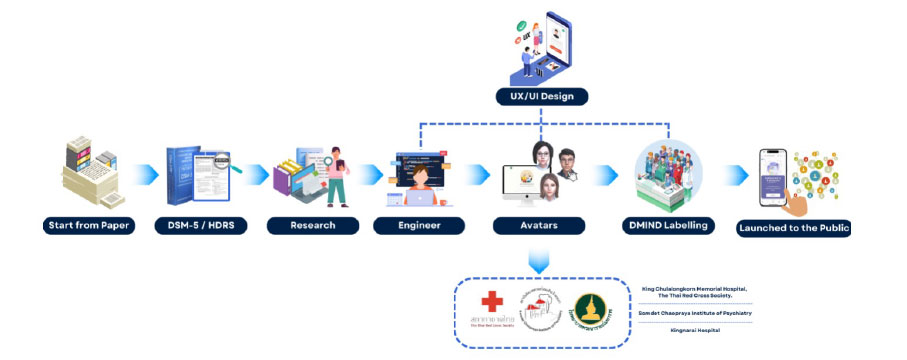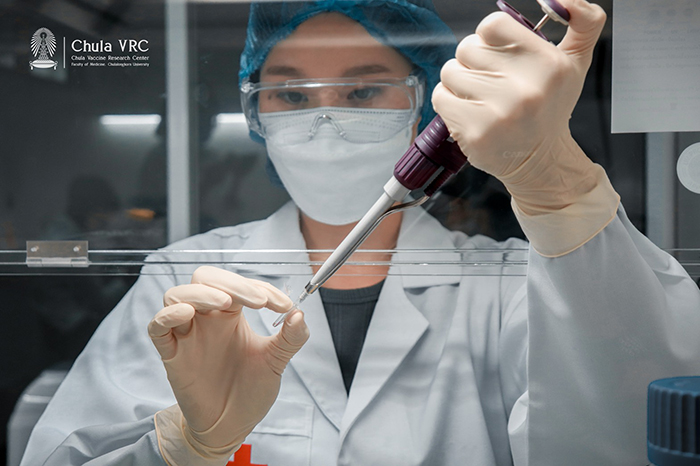“Thailand still faces limitations regarding access to mental health professionals, with only 9 psychiatrists available per 100,000 people in the population. Accordingly, Chulalongkorn University developed DMIND, an artificial intelligence depression prediction model using facial and voice data. The user’s depression risk is classified into one of three tiers: green (no/low risk), orange (moderate risk), and red (high risk).
Presently, this model can predict depression with an accuracy of 0.83 and is available to the public through the government’s “Mor Prompt” application. With this platform, the Thai population can easily access mental health self-assessment and follow-up services anytime, anywhere.
Since the launch of the DMIND service system through the Mor Prompt application, a total of 188,202 Thai individuals used the service from April 2022 to September 2023. Among these users, all 1,388 high-risk individuals received further counseling and support.”

A second can change everything. One second before the traffic light turns red. One second to cross the finish line. One second to being born. One second to push the blade into the wrist. One second for the heart to flatline. Life is measured in seconds. For those with depression, any second could be their last. DMIND values every single second.
The constant transformation and evolution of the world has impacted our quality of life. Currently, over 1.5 million people in Thailand suffer from depression. Depression remains a silent killer, claiming approximately 4,000 lives annually and contributing to roughly 53,000 suicide attempts every year in Thailand. Unfortunately, access to mental health services in the country is still very limited: for every 100,000 people, only 9 psychiatrists are available. These statistics highlight the fact that the existing support system is insufficient to meet the needs of those seeking mental health care.
Among the clinical tools available for assessing depression, the most widely used is the Hamilton Rating Scale for Depression (HDRS). The HDRS is considered the gold standard with high statistical reliability. Nevertheless, assessment is primarily limited to hospitals or primary care settings by psychiatrists or trained mental health professionals.
Chulalongkorn University recognizes the importance of preventing depression severity and curbing suicide rates to reduce loss of life and improve quality of living. Accordingly, a collaboration between the Faculty of Medicine and Faculty of Engineering at Chulalongkorn University was formed to develop a depression prediction model with enhanced accuracy. This project, known as DMIND, is a service that uses artificial intelligence (AI) to classify the individual’s depression risk into one of three tiers: green (no/low risk), orange (moderate risk), and red (high risk), integrating the HDRS with AI tools such as HSEmotion, Bert, Pyannote, ASR, SER, Sentiment Analysis, InsightFace, and TF-IDF. Presently, the model has an accuracy of 0.83 in predicting depression.
To enable preliminary self-assessment of depression and follow-up consultation in the Thai population, a partnership was established with the government’s “Mor Prompt” digital health pass system already available to the public for free. To support the integration, the Ministry of Public Health developed a centralized dashboard displaying the number of individuals who completed the DMIND assessment and consented to receive further assistance from public health personnel, which includes access to counseling and support through the 1323 Mental Health Hotline by the Department of Mental Health. Since the launch of the DMIND service system through the Mor Prompt application, a total of 188,202 Thai individuals used the service from April 2022 to September 2023. Among these users, all 1,388 high-risk individuals received follow-up counseling and support. A major challenge was that many individuals enabled audio but disabled video recording as they still do not trust AI. Consequently, model prediction accuracy is decreased due to less available features. Nevertheless, the project respects privacy rights, continues to develop precise labels from experts, and strives to illustrate the benefits of AI implementation in the mental health field.

BY
- Faculty of Engineering, Chulalongkorn University
- Faculty of Medicine, Chulalongkorn University
Related articles:
Others
Fungus Brings Forests Back to Life
CU-initiated project helping villagers see the economic value in reforestation





